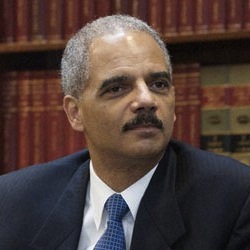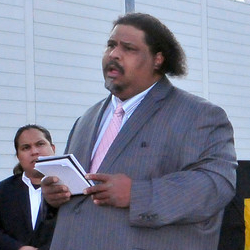4 Reasons Why a Settlement with BP is a Bad Idea
Thu, 2013-02-14 13:23
 Sort of like OJ Simpson (Yes. I figure he did it), BP "got over" in the US Justice Department's criminal case against them. They didn't win, but they gladly settled for $4 Billion rather than face a full trial with full public disclosure of exactly what happened before, during and after the Deepwater Horizon rig exploded on April 20, 2010.
So, kind of like the civil case that did tackle "The Juice" eventually, the Justice Department's civil case against BP must proceed to trial on February 25 - and not be "settled" for less money or less public scrutiny than what a full-blown trial would yield.
A sign-on letter requesting a full civil trial and not just another "settlement" will be delivered to US Attorney General Eric Holder (pictured) tomorrow.
Besides knowing that this glove fits BP, my four other reasons for signing are:
• Without a full and transparent Civil Trial, the truth regarding the causes and impacts of the largest environmental disaster in US history (Deepwater Horizon) will remain un-aired in any credible or transparent public forum, and remain obscured forever.
• A DOJ settlement with BP in lieu of a Civil Trial is very unlikely to result in BP paying the maximum fines allowed under law - a sum which the extremely costly restoration of our Gulf's damaged marshes, estuaries and open waters etc. requires.
• Neither egregious misbehavior by BP executives nor preventable disasters like Deepwater Horizon are likely to cease if the corporation and its top executives are not publicly scrutinized and held maximally accountable in a full and transparent Civil Trial. (BP has a long history of criminal offenses concerning environmental pollution and worker safety in addition to "Deepwater Horizon")
• Low-income and minority populations continue to bear the heaviest social, environmental and ecological burdens caused by BP's damage to Gulf Coast ecosystems and communities. A very wide range of unmitigated social and environmental impacts continues to fall disproportionately on tens of thousands of Native-, Vietnamese-, African-, Cajun-, Hispanic-, and other poor Bayou-American families and workers whose livelihoods, health, cultural identity and self-determination are the most dependent of anyone's upon the environmental resources that BP has damaged and/or ruined.
To see more on BP's history as a "Serial Polluter and Killer", take a look at this short video.
Derrick Christopher Evans is the director of Turkey Creek Community Initiatives and an adv
Sort of like OJ Simpson (Yes. I figure he did it), BP "got over" in the US Justice Department's criminal case against them. They didn't win, but they gladly settled for $4 Billion rather than face a full trial with full public disclosure of exactly what happened before, during and after the Deepwater Horizon rig exploded on April 20, 2010.
So, kind of like the civil case that did tackle "The Juice" eventually, the Justice Department's civil case against BP must proceed to trial on February 25 - and not be "settled" for less money or less public scrutiny than what a full-blown trial would yield.
A sign-on letter requesting a full civil trial and not just another "settlement" will be delivered to US Attorney General Eric Holder (pictured) tomorrow.
Besides knowing that this glove fits BP, my four other reasons for signing are:
• Without a full and transparent Civil Trial, the truth regarding the causes and impacts of the largest environmental disaster in US history (Deepwater Horizon) will remain un-aired in any credible or transparent public forum, and remain obscured forever.
• A DOJ settlement with BP in lieu of a Civil Trial is very unlikely to result in BP paying the maximum fines allowed under law - a sum which the extremely costly restoration of our Gulf's damaged marshes, estuaries and open waters etc. requires.
• Neither egregious misbehavior by BP executives nor preventable disasters like Deepwater Horizon are likely to cease if the corporation and its top executives are not publicly scrutinized and held maximally accountable in a full and transparent Civil Trial. (BP has a long history of criminal offenses concerning environmental pollution and worker safety in addition to "Deepwater Horizon")
• Low-income and minority populations continue to bear the heaviest social, environmental and ecological burdens caused by BP's damage to Gulf Coast ecosystems and communities. A very wide range of unmitigated social and environmental impacts continues to fall disproportionately on tens of thousands of Native-, Vietnamese-, African-, Cajun-, Hispanic-, and other poor Bayou-American families and workers whose livelihoods, health, cultural identity and self-determination are the most dependent of anyone's upon the environmental resources that BP has damaged and/or ruined.
To see more on BP's history as a "Serial Polluter and Killer", take a look at this short video.
Derrick Christopher Evans is the director of Turkey Creek Community Initiatives and an adv
4 Reasons Why a Settlement with BP is a Bad Idea
 Sort of like OJ Simpson (Yes. I figure he did it), BP "got over" in the US Justice Department's criminal case against them. They didn't win, but they gladly settled for $4 Billion rather than face a full trial with full public disclosure of exactly what happened before, during and after the Deepwater Horizon rig exploded on April 20, 2010.
Sort of like OJ Simpson (Yes. I figure he did it), BP "got over" in the US Justice Department's criminal case against them. They didn't win, but they gladly settled for $4 Billion rather than face a full trial with full public disclosure of exactly what happened before, during and after the Deepwater Horizon rig exploded on April 20, 2010."Come and see for yourselves": My remarks at the BP shareholder meeting
 Today, two community advocates and regional leaders from the Gulf Coast, Bryan Parras and Derrick Evans, brought an urgent message to BP's board and shareholders, at the corporation's annual meeting. Here are Evans' remarks as prepared for delivery. Evans is the founder of Turkey Creek Community Initiatives (TCCI), a Founding Advisor of the Gulf Coast Fund, and Bridge The Gulf advisor and contributor. He is from Gulfport, MS. Read more about the meeting here.
Today, two community advocates and regional leaders from the Gulf Coast, Bryan Parras and Derrick Evans, brought an urgent message to BP's board and shareholders, at the corporation's annual meeting. Here are Evans' remarks as prepared for delivery. Evans is the founder of Turkey Creek Community Initiatives (TCCI), a Founding Advisor of the Gulf Coast Fund, and Bridge The Gulf advisor and contributor. He is from Gulfport, MS. Read more about the meeting here.Good morning. My name is Derrick Christopher Evans and I don't speak for the American government, but I am a citizen of the United States and a resident of the Gulf Coast. I live in from Gulfport, Mississippi – which is midpoint between New Orleans, Louisiana; 60 miles west of Mobile, Alabama. More specifically, I hail from Turkey Creek – an African-American settlement founded by my former slave ancestors in 1866, and a tidal bayou connected to the northern Gulf of Mexico by Biloxi Bay and the Mississippi Sound.
Derrick Evans is the director of Turkey Creek Community Initiatives and an advisor to the Gulf Coast Fund for Community Renewal and Ecological Health. Since 2001 he has worked to help protect and revitalize his coastal Mississippi community and sister communities throughout the region. Prior to that he taught civil rights history at Boston College and social studies in the Boston Public Schools.

No comments:
Post a Comment